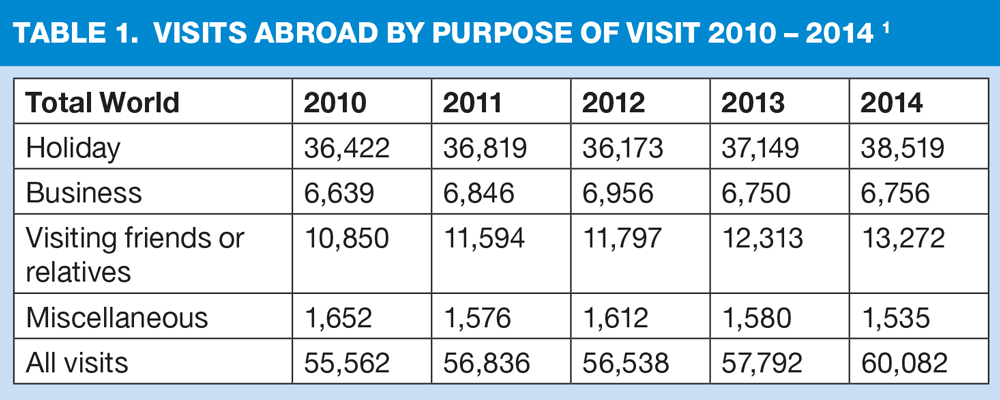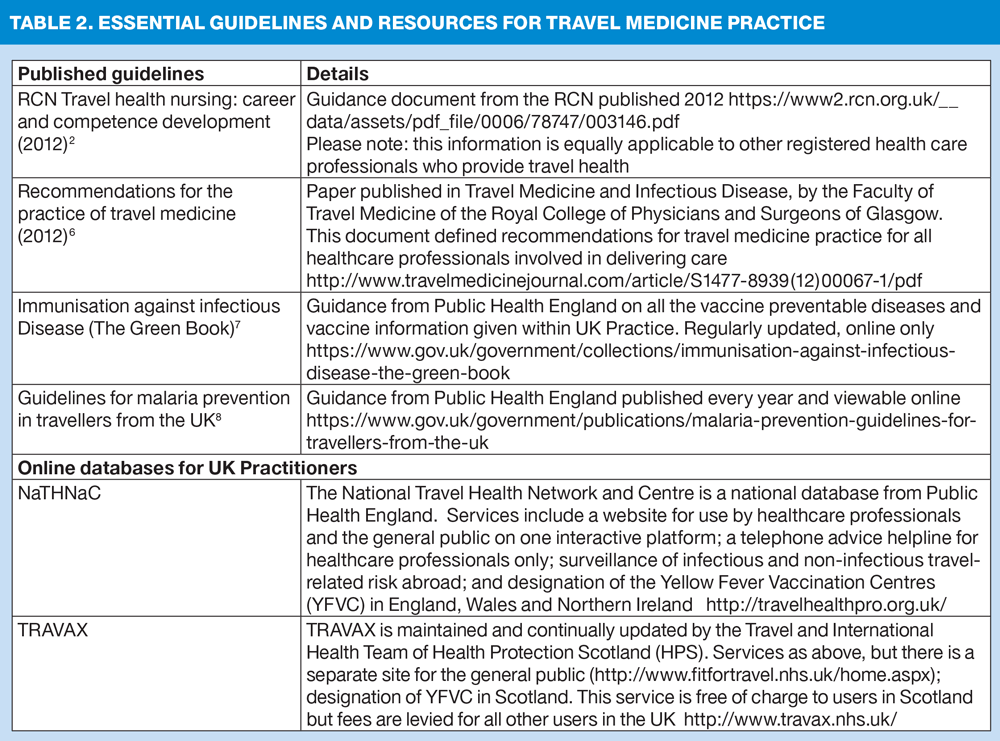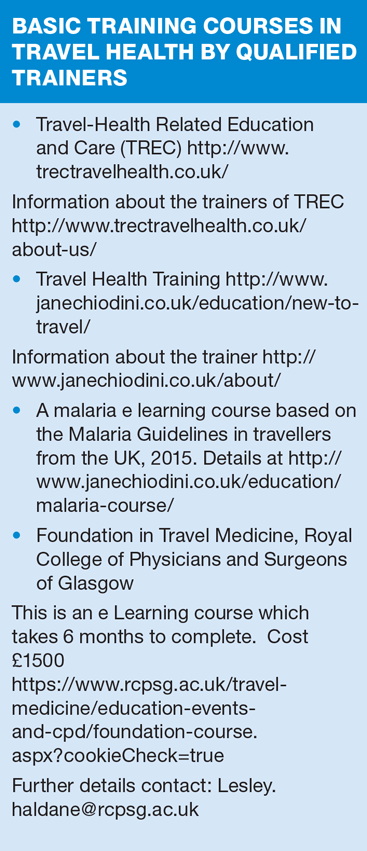New to travel health? How to get started
Jane Chiodini
Jane Chiodini
MSc(Travel Med), RGN, RM, FFTM RCPS(Glasg), QN
Director of Education, Faculty of Travel Medicine, RCPS(Glasgow)
Practice nurses can start a new job and find that they are expected to provide travel health services to the practice’s patient population. But what do they need to know and where do they go for training? Practice Nurse’s travel health expert has the answers
Travel health is a specialist field of practice that is poorly understood by the general public and some healthcare professionals alike. However, the desire to travel is a global phenomenon, and since the development of technologies such as the internet and social media, the desire, ability and affordability to travel is open to an ever increasing number of people. Trips are made for a variety of reasons including holiday, business, humanitarian aid work, to visit their friends and relatives (VFRs) and while the economic downturn of recent years has had impact on the numbers of UK travellers going abroad, recent figures (Table 1) show an upward trend again with significant increase in the VFR-type traveller. It is important that the person travelling appreciates any potential health risks of a trip, and to encourage such understanding the healthcare provider must be adequately trained to deliver this care.
SAFE TRAVEL HEALTH PRACTICE
In 1995, the UK was the first country in the world to develop formal training in travel health (also known as travel medicine). This was a multidisciplinary course at the University of Glasgow up to Masters degree level with predominantly doctors and nurses undertaking the study. In 2006 the Faculty of Travel Medicine of the Royal College of Physicians and Surgeons of Glasgow was formed. This was a unique opportunity for non-medical healthcare professionals to become part of a Royal Medical College based on their specialist qualifications, and a high honour for nurses. In 2007, the Royal College of Nursing (RCN) published the first formal guidance for travel health – Travel health nursing: career and competence development, which was updated in 2012,2 and it is currently under review again. Resources and guidelines for travel health practice can be seen in table 2. While there is no statutory requirement for practitioners to undertake training in this now complex subject, professional codes of conduct dictate that the person undertaking the task must be competent to do so,3-5 and this also applies to travel health.
WHO PRACTISES TRAVEL HEALTH?
In the 1980s and early 1990s many GPs provided travel health but now the service is predominantly provided by registered nurses in the UK. As this is such a complex field of practice it is not considered suitable for healthcare assistants to provide travel health or travel vaccines or indeed the majority of childhood immunisations, except for nasal influenza vaccine to children and influenza, pneumococcal and shingles vaccines to adults.9 Some doctors undertake travel health particularly in private travel clinics and online travel health services. In recent years, pharmacists have been taking a much larger role in travel health with some setting up standalone travel services, particularly in the multi-national pharmacy chains.
WHERE IS TRAVEL HEALTH PRACTISED?
An increasing number of private travel clinics have been set up in recent years in a variety of settings, but the bulk of travel health is still delivered in primary care. This dates back 50 years to the 1966 GP contract when it was decided that certain travel vaccines would be provided on the NHS to minimise public health risk from travellers returning with such diseases. This principle still prevails today and vaccines to protect against hepatitis A, typhoid, polio and cholera alone or in combination (for example, hepatitis A and typhoid combined or hepatitis A and hepatitis B combined) are provided on the NHS.
The provision of vaccinations and immunisations has been an additional, enhanced service in a primary care setting since 2004. This service includes not only travel vaccines provided on the NHS, but also other immunisations such as the pre school booster, rabies vaccine pre-exposure to those working in an at risk environment e.g. at animal quarantine stations or bat handlers (note pre-exposure rabies vaccine is never provided on the NHS to travellers). A total of 2% of the global sum is allocated for this additional service. Details are set out in Annex BA of the Statement of Financial Entitlements (SFE)5 at https://www.gov.uk/government/publications/the-statement-of-financial-entitlements-amendment-no2-directions-2012
Since travel health is part of this additional service, an NHS practice does not have to provide it, but if the practice opts out it must inform its Clinical Commissioning Group, which is responsible for identifying an alternative provider (and it is the new provider that will be remunerated for the work). For further information see: http://www.janechiodini.co.uk/news/faqs/faq-3/
WHAT TRAINING DO THOSE NEW TO TRAVEL HEALTH NEED?
Very often a new practice nurse starting at a GP surgery will not know what is involved in travel health, may be sent on a local half-day educational event on the subject and is then expected to undertake travel health appointments. All surgery staff involved in providing the service need an understanding of the complexity of travel health to ensure best and safe practice, so a half day of study would never be adequate in any situation. The RCN competency document suggests a minimum of 15 hours of study and mentorship as well. The initial training needs to help the learner understand:
- The complexity of a travel risk assessment
- The questions that need to be asked for risk assessment and the rationale for these enquiries
- The ability to ‘translate’ the information collected, in conjunction with advice provided by the national travel health databases, into individualised recommendations for the traveller’s care
- The need for advice to manage travel risks – not only vaccination, but also lifestyle risks, to include:
- Accident prevention
- Safe food, water and personal hygiene
- Prevention of blood-borne infections and sexually transmitted diseases
- General insect bite prevention
- Prevention of infection from animal bites, particularly rabies, including wound management
- Prevention of sun and heat complications
- Personal safety and security
- Malaria prevention advice
- Good geographical knowledge in relation to the risks
- Comprehension of the travel related diseases
- Specific knowledge of the travel vaccines including how travel vaccines work (immunology and vaccine ‘rules’), how they are prescribed, stored (the ‘cold chain’), correct vaccine technique, financial aspects i.e. when to charge and ordering stock.
In 2015 more than 1,500 travellers returned to the UK with malaria, which is a preventable and curable infection. So advice on malaria prevention is essential but there is a lot to learn to ensure that appropriate advice on awareness, diagnosis and choice of chemoprophylaxis is given. Attention must also be given to bite prevention, essential not only for malaria but other mosquito borne diseases such as dengue, Chikungunya and Zika virus for which there are currently no vaccines. Prevention advice is important as these diseases can have devastating outcomes.
WHERE CAN TRAINING BE OBTAINED?
Unfortunately, there are not that many providers of basic travel health training from trainers who are fully qualified in travel health medicine. Care should be taken when booking an independent course to ensure the trainer is trained to a higher level of travel health and, ideally, is also in clinical practice. Some providers are listed in Box 1. In addition to training, mentorship is very helpful for the person new to travel health.
WHAT SHOULD HAPPEN NEXT?
After some initial tuition, the nurse should consider undertaking a travel risk assessment alongside a colleague, and then compare the conclusions they have each reached. This would involve collecting the information, using a national database to assess the risk and recommendations for advice and any necessary vaccines and malaria chemoprophylaxis. Being prepared with such information also makes it far easier when starting to consult with the traveller. The nurse should have the opportunity to explain the risks and advice to allow a discussion concluding in chosen vaccines, chemoprophylaxis and general advice to be followed. Informed consent is also necessary if travel vaccines need to be administered.
CONCLUSION
The most interesting thing about travel health is that no two travellers will present with the same history or issues so the advice has to be very individualised. If the nurse is properly trained and has had mentorship and practice sessions in a non-threatening environment, he or she will soon develop the skills and confidence to undertake travel health in a safe and efficient manner. Those who are allowed to time to do so often find they really enjoy the subject, find working in this field very rewarding, become knowledgeable and efficient, and gain great job satisfaction.
READ AND REFLECT
Complete the questions in the related CPD module to test your knowledge. On completion you can download a certificate for 1 hour of CPD to add to your revalidation portfolio.
REFERENCES
1. Office for National Statistics. Dataset: UK Residents Visits Abroad 2010 – 2014 http://www.ons.gov.uk/peoplepopulationandcommunity/leisureandtourism/datasets/ukresidentsvisitsabroad
2. Chiodini J, Boyne L, Stillwell A, Grieve S. Travel health nursing: career and competence development, RCN guidance. RCN: London, 2012.
3. Nursing and Midwifery Council. The Code Professional standards of practice and behaviour for nurses and midwives, 2015. https://www.nmc.org.uk/standards/code/
4. General Medical Council. Good Medical Practice http://www.gmc-uk.org/guidance/good_medical_practice.asp
5. General Pharmaceutical Council. Standards of conduct, ethics and performance http://www.pharmacyregulation.org/standards/conduct-ethics-and-performance
6. Chiodini JH, Anderson E, Driver C, et al. Recommendations for the practice of travel medicine, Travel Medicine and Infectious Disease 2012, 10, pp. 108-128, London: Elsevier.
7. Public Health England. Immunisation against infectious disease https://www.gov.uk/government/collections/immunisation-against-infectious-disease-the-green-book
8. Chiodini PL, Patel D, Whitty CJM and Lalloo DG. Guidelines for malaria prevention in travellers from the United Kingdom, 2015. London: Public Health England, September 2015. https://www.gov.uk/government/publications/malaria-prevention-guidelines-for-travellers-from-the-uk
9. Public Health England National Minimum Standards and Core Curriculum for Immunisation Training of Healthcare Support. https://www.gov.uk/government/publications/immunisation-training-of-healthcare-support-workers-national-minimum-standards-and-core-curriculum%20
Related articles
View all Articles


